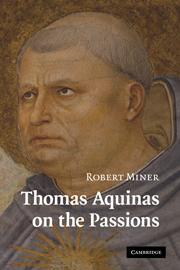Book contents
- Frontmatter
- Contents
- List of figures
- List of tables
- Acknowledgments
- A note on the texts
- Introduction
- Part 1 THE PASSIONS IN GENERAL
- Part 2 PARTICULAR PASSIONS: THE CONCUPISCIBLE PASSIONS
- Part 3 PARTICULAR PASSIONS: THE IRASCIBLE PASSIONS
- 9 Hope and despair
- 10 Fear
- 11 Daring
- 12 Anger
- Epilogue: The passions, the virtues, and happiness
- Bibliography
- Index
Epilogue: The passions, the virtues, and happiness
Published online by Cambridge University Press: 06 July 2009
- Frontmatter
- Contents
- List of figures
- List of tables
- Acknowledgments
- A note on the texts
- Introduction
- Part 1 THE PASSIONS IN GENERAL
- Part 2 PARTICULAR PASSIONS: THE CONCUPISCIBLE PASSIONS
- Part 3 PARTICULAR PASSIONS: THE IRASCIBLE PASSIONS
- 9 Hope and despair
- 10 Fear
- 11 Daring
- 12 Anger
- Epilogue: The passions, the virtues, and happiness
- Bibliography
- Index
Summary
The inquiry into the passions in the 1a2ae is lengthy and detailed. Pinckaers observes that while Aquinas addresses the passions in multiple texts, only in the ST does he give “free play to his genius,” considering each passion with the care that it deserves (1990, p. 379). Nevertheless, Aquinas does not write Questions 22–48 as though thinking about the passions were an end in itself. The whole treatment precedes the consideration of virtue. Knowing about the passions, in some detail, is necessary for any serious ethics. As Gondreau observes, “Accurate moral theory . . . must take the passions into strict account” (2002, p. 265). But the overriding aim, as the Prologue of the 1a2ae reminds us, is to promote the motion of the rational creature ad finem (§4.2). Such motion is impossible without the virtues. Aquinas devotes such a large amount of space to the passions, because he does not think that adequate knowledge of the virtues is possible without a prior grasp of the passions.
What does one learn about the virtues by considering their relation to the passions? What more does one learn about the passions by attending to the role they play in the 1a2ae's treatment of the virtues? In Question 55, the first Question on the virtues as such, Aquinas fixes some basic terms that are crucial for understanding his approach. As an accident, virtue has no “matter out of which” (materia ex qua) it is formed.
- Type
- Chapter
- Information
- Thomas Aquinas on the PassionsA Study of Summa Theologiae, 1a2ae 22–48, pp. 287 - 299Publisher: Cambridge University PressPrint publication year: 2009



